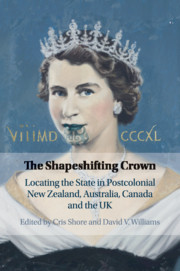 The Shapeshifting Crown
The Shapeshifting Crown Book contents
- The Shapeshifting Crown
- The Shapeshifting Crown
- Copyright page
- Contents
- Figures
- Acknowledgements
- Table of Statutes and Cases
- 1 Introduction
- Part I The Nature and Development of the Crown
- 2 Genealogies of the Modern Crown
- 3 The Crown as Metonym for the State?
- 4 Indigenous Peoples and the Crown
- Part II The Crown as an Embodied Entity
- Part III The Crown and Constitutional Reform
- Index
- References
3 - The Crown as Metonym for the State?
The Human Face of Leviathan
from Part I - The Nature and Development of the Crown
Published online by Cambridge University Press: 13 January 2019
- The Shapeshifting Crown
- The Shapeshifting Crown
- Copyright page
- Contents
- Figures
- Acknowledgements
- Table of Statutes and Cases
- 1 Introduction
- Part I The Nature and Development of the Crown
- 2 Genealogies of the Modern Crown
- 3 The Crown as Metonym for the State?
- 4 Indigenous Peoples and the Crown
- Part II The Crown as an Embodied Entity
- Part III The Crown and Constitutional Reform
- Index
- References
Summary
- Type
- Chapter
- Information
- The Shapeshifting CrownLocating the State in Postcolonial New Zealand, Australia, Canada and the UK, pp. 53 - 74Publisher: Cambridge University PressPrint publication year: 2019
